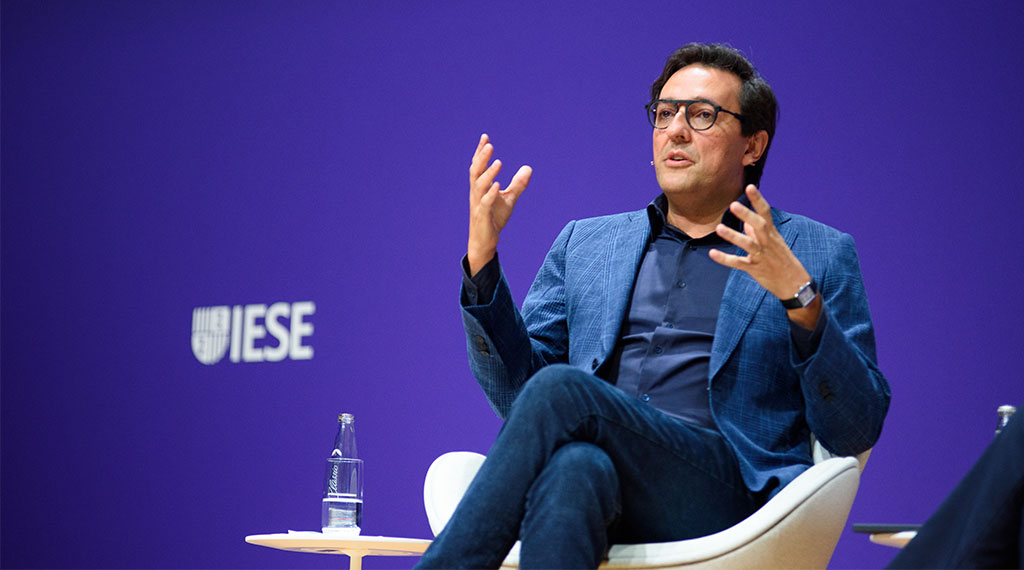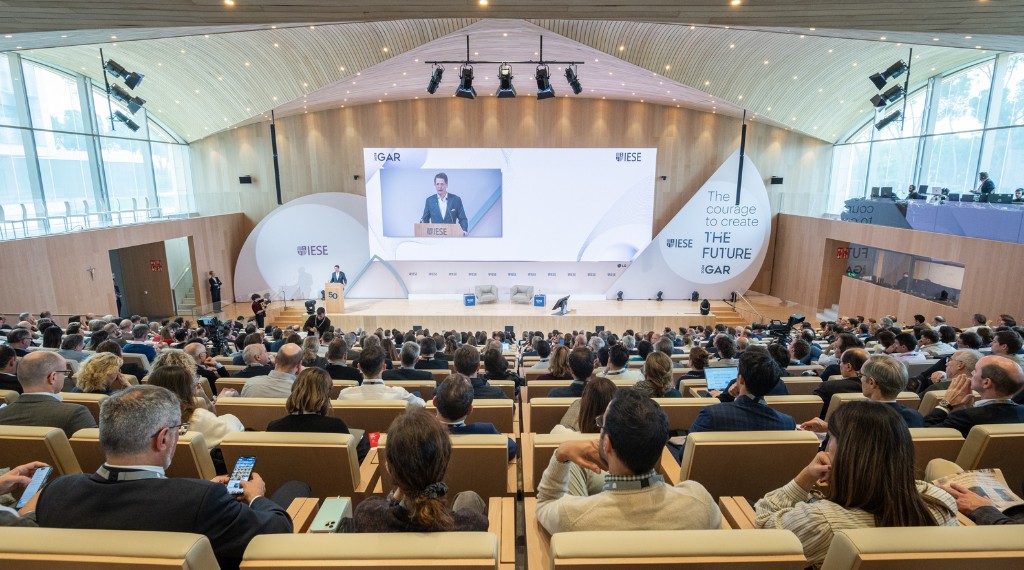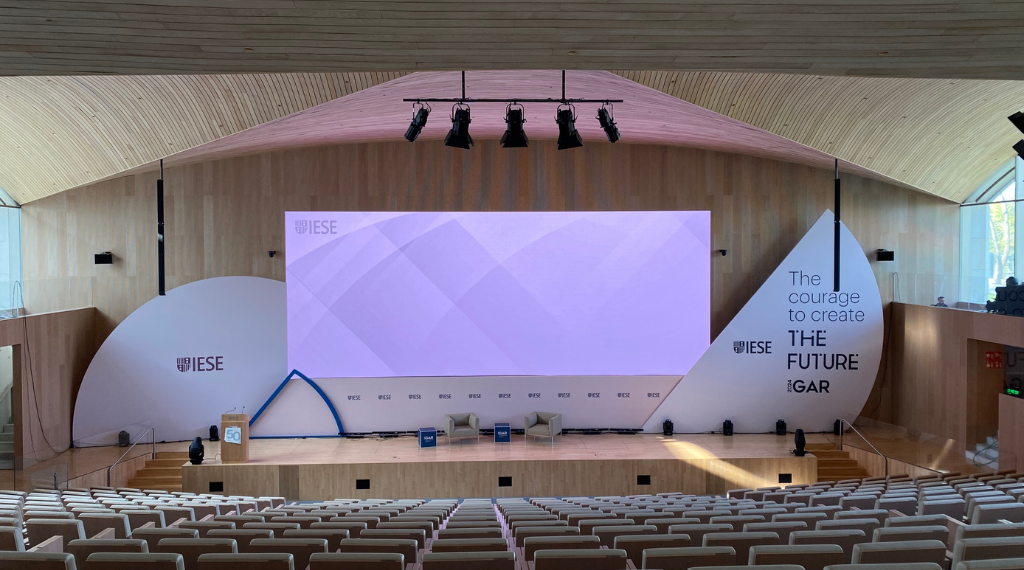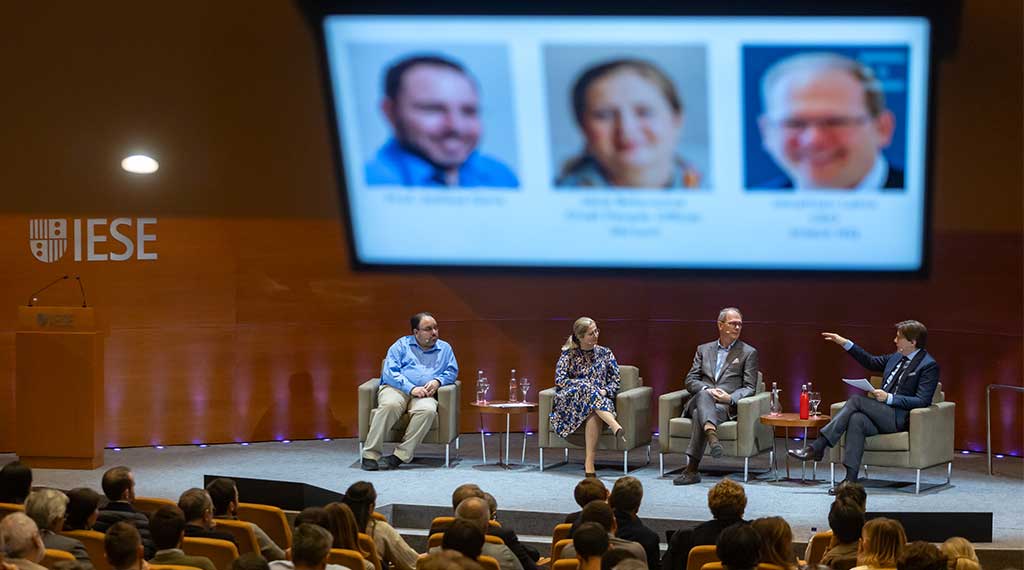Stories
Artificial intelligence takes center stage at Global Alumni Reunion 2022
Munich event looks at AI’s impact on individuals, organizations, markets and geopolitics
Dario Gil, Senior Vice President and Head of Research at IBM, speaks at the Global Alumni Reunion 2022 in Munich.
Photo: Edu Ferrer
October 7, 2022

IESE’s Global Alumni Reunion 2022 has ended, bringing to a close a three-day event that explored how artificial intelligence is reshaping individuals, organizations, markets and geopolitics – and generating complex ethical challenges along the way.
This year’s event, which was held in Munich and had 2,000 people registered to attend online and in-person, took place as artificial intelligence enters a new phase for businesses. While for much of its history AI failed to live up to its promises, it is now beginning to deliver. But because its applications are so many and varied, its implications are as well.
Echoing the theme of this year’s reunion – Artificial intelligence: Using Your Power for Good – Dean Franz Heukamp made a call for ethical leadership in this emerging technology: “There’s power and there’s good and they need to come together,” he said.
AI impact on individuals at work and home
Artificial intelligence will have a growing influence on individuals in both their private and professional lives – as customers and clients whose data is harvested and as employees working in data-driven workplaces.
Data is what feeds AI and the bulk of that data comes from customers – immediately raising issues of privacy. It’s crucial for companies to ensure privacy is respected, and also to work on areas such as trust, fairness, transparency and explainability. “New technologies can only establish themselves over the long term if they are trusted,” said Judith Gerlach, Bavarian State Minister for Digital Affairs.
In the professional sphere, AI may change the jobs people do and don’t do, and also how they do the jobs that continue to exist. Employees – especially mid- to late-career workers – must upskill or risk being left behind. “If it changes work processes, it also changes the nature of human tasks, and the skills needed for those tasks,” Prof. Sampsa Samila said. Samila is head of IESE’s Artificial Intelligence and the Future of Management Initiative; professors Javier Zamora and Mireia Giné were academic directors of the GAR.
The changing skills also carry over into managers – who must understand AI without necessarily being technological whizzes. “Like many other things, you need to learn about technologies constantly, AI being one of them,” said SAP Chief Technology Officer Juergen Mueller. But it goes beyond technological competencies. “You need skills and data and then maybe something you wouldn’t think about: creativity. You need to be creative enough to challenge the existing processes.”
For companies, taking small steps with big potential
For Dario Gil, Senior Vice President and Head of Research at IBM, AI has now moved into a phase that makes it more accessible for more companies. If early adapters had to take on the Herculean task of collecting, labelling and cleaning massive data sets, companies now can use foundation models, which are algorithms that have already been pre-trained.
But companies need not feel like they have to overhaul their business models in order to adapt AI. Instead, they can incorporate it into specific processes, and build from there.
Gil sees two immediate areas where businesses can put AI to use: customer care and IT management. “What is possible now with AI in customer care is already so proven it’s a question of scale and diffusion,” Gil said.
Philippe Sahli, Co-founder and CEO of Yokoy, discussed how AI solves small steps of larger processes. Yokoy uses AI in accounts payable: it looks at financial documents and decides which kind of document it is, taking that task off human workers. “For us, AI solves small parts along the value chain,” he said.
Florian Deter, managing director of Microsoft Germany, agreed: “Start small, see what the power is, access existing platforms like Microsoft.”
Nazim Cetin, CEO of Allianz X, is somewhat skeptical of lofty claims about the reach of artificial intelligence, which he sees more as algorithms and machine learning than true intelligence. “If you talk about artificial intelligence, I go back and say, ‘What is intelligence?’”
The use of AI of course looks very different at a company like Volkswagen and Porsche, whose CEO Oliver Blume spoke at a dinner Thursday. Blume said Porsche uses predictive AI for anticipating maintenance, sales and customer needs – even down to planning food in company kitchens to prevent waste.
The company is also experimenting with AI in autonomous driving vehicles, where he sees many practical applications, such as autonomous charging and maintenance.
Markets, geopolitics and artificial intelligence intertwined
Technology also now forms part of the geopolitical landscape. Some tech companies are valued at more than the GDPs of many countries, giving them enormous clout. The countries investing most in AI – the United States and China top among them – have a contentious relationship. And technologies such as AI can be used as a political tool.
As a recent controversy surrounding Taiwan’s dominance of the microchip market illustrates, technology, markets and politics are inextricably intertwined. For María Marced, President of TSMC Europe, the semiconductor industry will continue to be that way, since no single country or region can go it alone. “Geopolitical collaboration is going to be crucial,” she said. She does, however, see a hybrid model for manufacturing – where some elements are local and some are international.
The stakes are high, noted Prof. Llewellyn D. W. Thomas: “AI is not just a technology. AI has the ability to profoundly shape economic development. It has the ability to profoundly shape the nature of human rights. It has the ability to be profoundly disruptive.”


